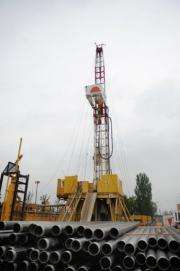A a geothermal borehole beng drilled. A prominent US environmentalist said Japan should focus on developing geothermal energy, saying the volcanic island-nation could become the global leader in the field.
A prominent US environmentalist said Wednesday Japan should focus on developing geothermal energy, saying the volcanic island-nation could become the global leader in the field.
"Japan could make geothermal energy the centre of its new energy economy just as the US or China will make wind the centre of theirs," Lester Brown, president of the US-based Earth Policy Institute, told a news conference.
"There are no leaders in the world today in this field. There is no industrial country in the world that now has a well established geothermal industry" Brown said at the Foreign Correspondents Club of Japan.
Japan, located at the crossroads of four tectonic plates and on what is known as the "Pacific Ring of Fire" and dotted with volcanoes, is one of the world's most quake-prone countries.
If Japan can launch full development of geothermal energy technology, "it would not only lower carbon emissions in Japan, but it would also give Japanese industry the potential for playing a leading role in developing the world's geothermal energy resources." he said.
Brown noted that demand for the technology will grow in other geothermal-rich countries located on tectonic faultlines such as Indonesia and the Philippines in Asia as well as Chile, Peru and Colombia in South America.
"This is an opportunity for Japan to move to the centre stage in an area where it is richly endowed," he added.
Japan makes use of hot springs as a resource for tourism, but geothermal energy only accounts for 0.3 percent of its energy mix, and the country relies heavily on imports of oil and other resources.
Japan, Asia's biggest economy, has pledged to cut greenhouse emissions by 25 percent by 2020 from 1990 levels, provided other major emitters also make sharp reductions, one of the most ambitious targets of any industrialised country.
Japan is the fifth largest emitter of greenhouse gases, which are blamed for raising global temperatures, melting the Earth's ice caps and glaciers, and changing weather patterns.
(c) 2010 AFP























